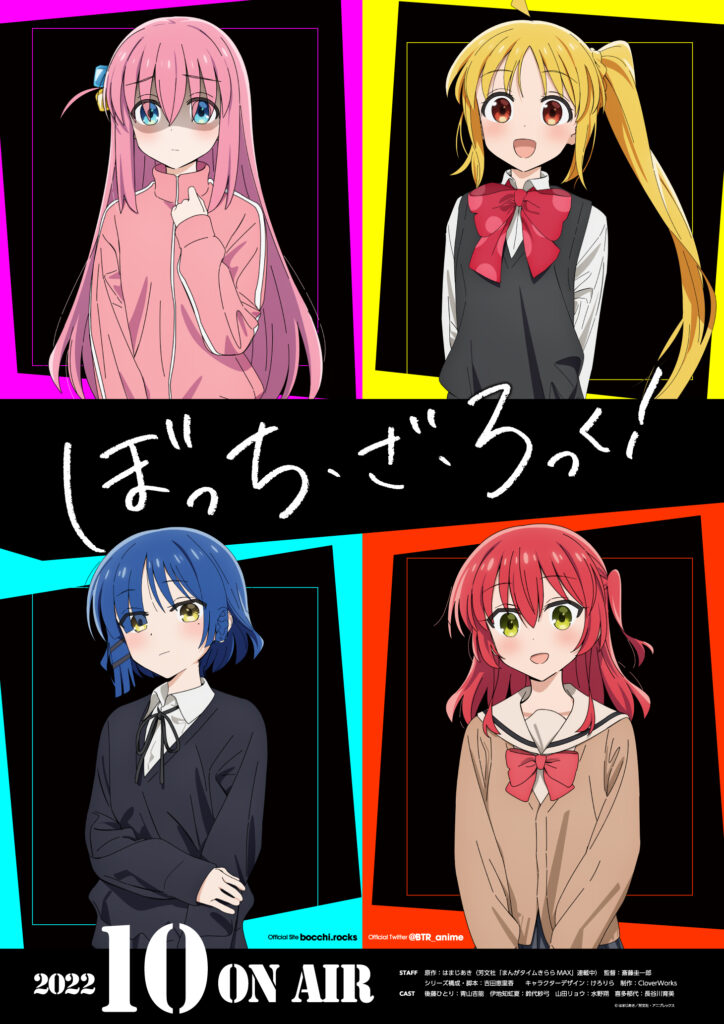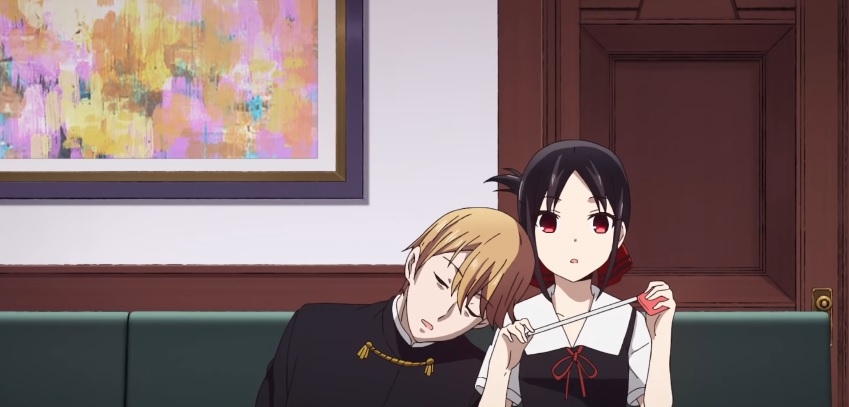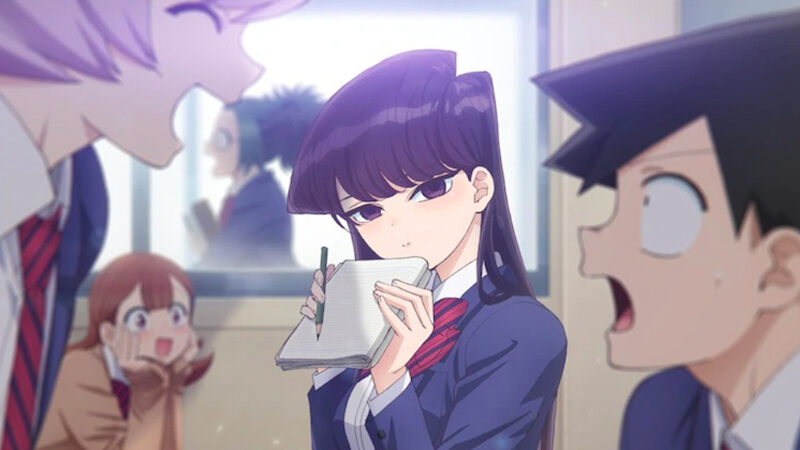
Komi Can’t Communicate focuses on the perception and the challenges of having social anxiety. Komi is the most beautiful and popular girl in high school, but she suffers from social anxiety to the point where she can’t speak to anyone. The attention her fellow students lavish on her only makes the anxiety worse. She wants nothing more than to have normal friends. Her adventure begins when she writes her concerns to her classmate and desk-neighbor, Tadano. Tadano is a normal guy who is able to read the room and read her (but he is still dense at times). He befriends her and promises to help her make 100 friends.
Tadano accepts Komi as she is and tries to minimize her anxiety while still supporting her efforts to stretch. He reads through her stoic demeanor and is usually able to guess what she wants or what’s on her mind. And he also treats her as a normal person instead of the most popular girl in school. This helps Komi when her anxiety hits the roof.
Tadano also brings the extreme extrovert Najima into Komi’s friend circle. Through Najima, Komi gains ample chances to make friends. Like Tadano, Najima just accepts Komi’s trouble speaking to people as part of who she is. Although, sometimes Najima uses it for ichi’s amusement (Najima is nonbinary).
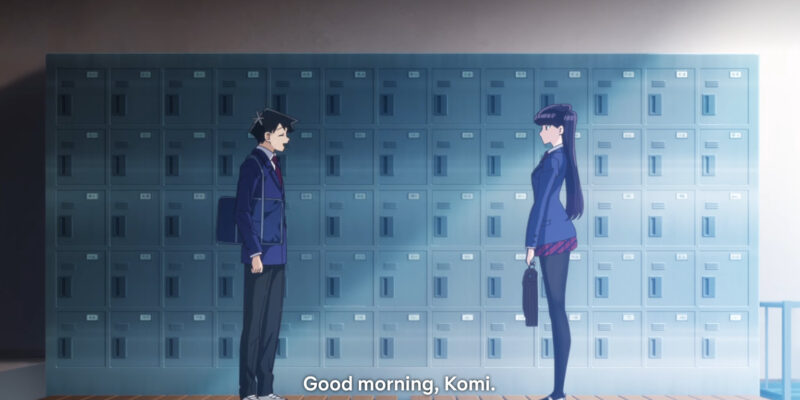
While the anime plays Komi’s social anxiety for some laughs, particularly people’s misconception of Komi, it also takes social anxiety seriously. The anime shows how difficult everyday things, such as checking out a book at a library or ordering a coffee in a busy coffee shop, can be when you have extreme social anxiety. Komi paces and builds courage before stretching to make the attempt.
Komi Can’t Communicate offers perspective for those who have social anxiety. And I’m one of those people. I’ve had social anxiety as far back as I can remember. I’ve had it under control for a long time now, but it wasn’t easy to get to that point. I began working with the general public at a grocery store when I was 15. As you can imagine, this wasn’t easy. The road toward control wasn’t an easy one. Panic attacks, grinding teeth in sleep, chest pain were just a few payments for learning control. Komi also suffers from similar discomforts in the anime.
For the socially anxious, society isn’t kind. Extroversion is the norm, while quietude is considered neurotic. From my perspective, people who must always be around others are the neurotic ones! It becomes unhealthy if you can’t spend time in your own company. But anyway: in the anime, Najima’s extreme extroversion hints at ichi’s inability to spend time alone. A misconception about the socially anxious and the introverted is the idea that we don’t like people. That’s wrong. We want and need social interaction, just not in large amounts nor in a forced schedule. The anime often states this. It urges patience for those who are socially inclined.
The socially anxious also need to accept themselves while still stretching as Komi does. She accepts her difficulty while working to improve. Acceptance of oneself doesn’t mean you don’t work to change. Rather, you don’t beat yourself up as you work on your own growth. Sometimes Komi beats herself up, but Tadano’s support reminds her that she has made a lot of progress. As Confucius wrote: “It does not matter how slowly you go, as long as you do not stop.” Komi provides a good example of this adage.
Komi Can’t Communicate surprised me with how sympathetic it treated Komi’s social anxiety. It certainly is played for jokes at times, but not in a way that is disrespectful of the challenge social anxiety poses in a socially “loud” world. Often the jokes poke fun at social norms instead. The way the other characters support Komi provides a good example of what people should do. Instead of saying inane things like “smile!” or “It’s not so bad” or “You should talk more,” the characters encourage Komi with what she has decided to practice. They also include her in their plans, but they don’t pressure her. They allow her space when needed.
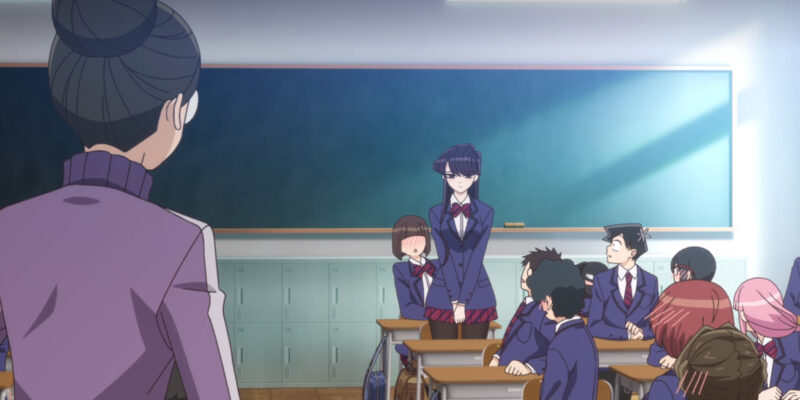
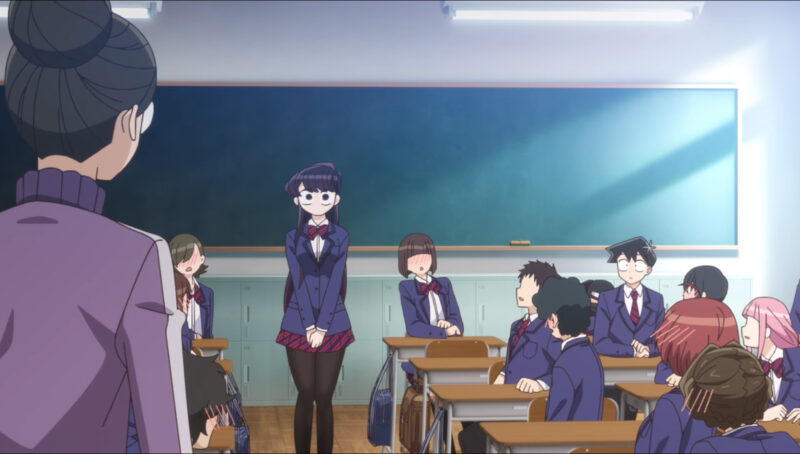
The anime’s exaggerated, yet simplified designs capture the inner feelings of the characters well. Komi’s simplified, large eyes, show the extreme attention and alertness the anxious can feel. The simplistic nature of the animation works fine for the story. Compare the two images above. The top image shows everyone’s perception of Komi–beautiful, posed. The image below is Komi’s emotional state. Her eyes show her inner anxiety, which no one except Tadano sees. Throughout the anime, you see this juxtaposition of outside perception and Komi’s inner perception. The contrast serves as a good reminder that people rarely see your inner state. Consider a swan speeding across a lake. They appear elegant and graceful as they swim, but under the water, they are paddling and churning the water. Fortunately, Komi’s friends start to see this and work to help her as good friends do. Najima pushes while Tadano offers support and calls down the others when he sees Komi is completely overwhelmed. Sometimes in the story, Komi’s “poise” is envied by side characters, and these characters wish they could be her. It’s part joke, after all the viewer knows how hard Komi has it, and part truth. People often want to be someone else without knowing what is going on inside. A person who looks confident, cool, and calm might be barely holding it together inside.
Overall, Komi Can’t Communicate addresses a topic that is often ridiculed or seen as a detriment. While anxiety holds Komi from her goals, she also makes steady, if slow, progress. The anime made me remember my own struggles with social anxiety. The anime also doesn’t suggest social anxiety is something that will go away. That’s the thing about it; it doesn’t ever disappear completely. You can learn to control it and reduce it, but as I learned, social anxiety never fully goes away. And that’s okay. I, for one, relish the idea of mastery. Mastery is when you never reach an end to the progress you can make. Spiritual work, personal growth, writing, art, carpentry, sculpture, and many other things sit in the realm of mastery. They can never be completed, and that is what makes them wonderful. Social anxiety sucks, but it can lead to personal growth. While Komi Can’t Communicate is a comedy, it offers a sympathetic look at a real difficulty many deal with and shows how personal growth can work with supportive friends.

